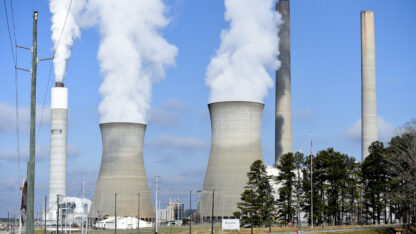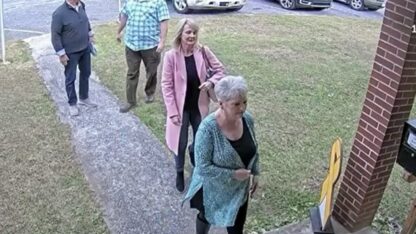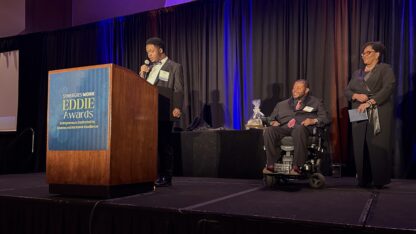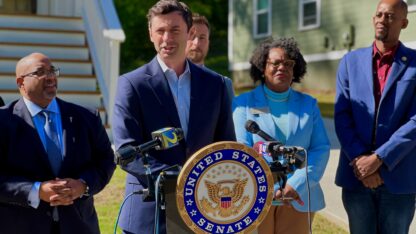Development, Unimpeded By Pandemic, Displaces Northwest Atlanta Community
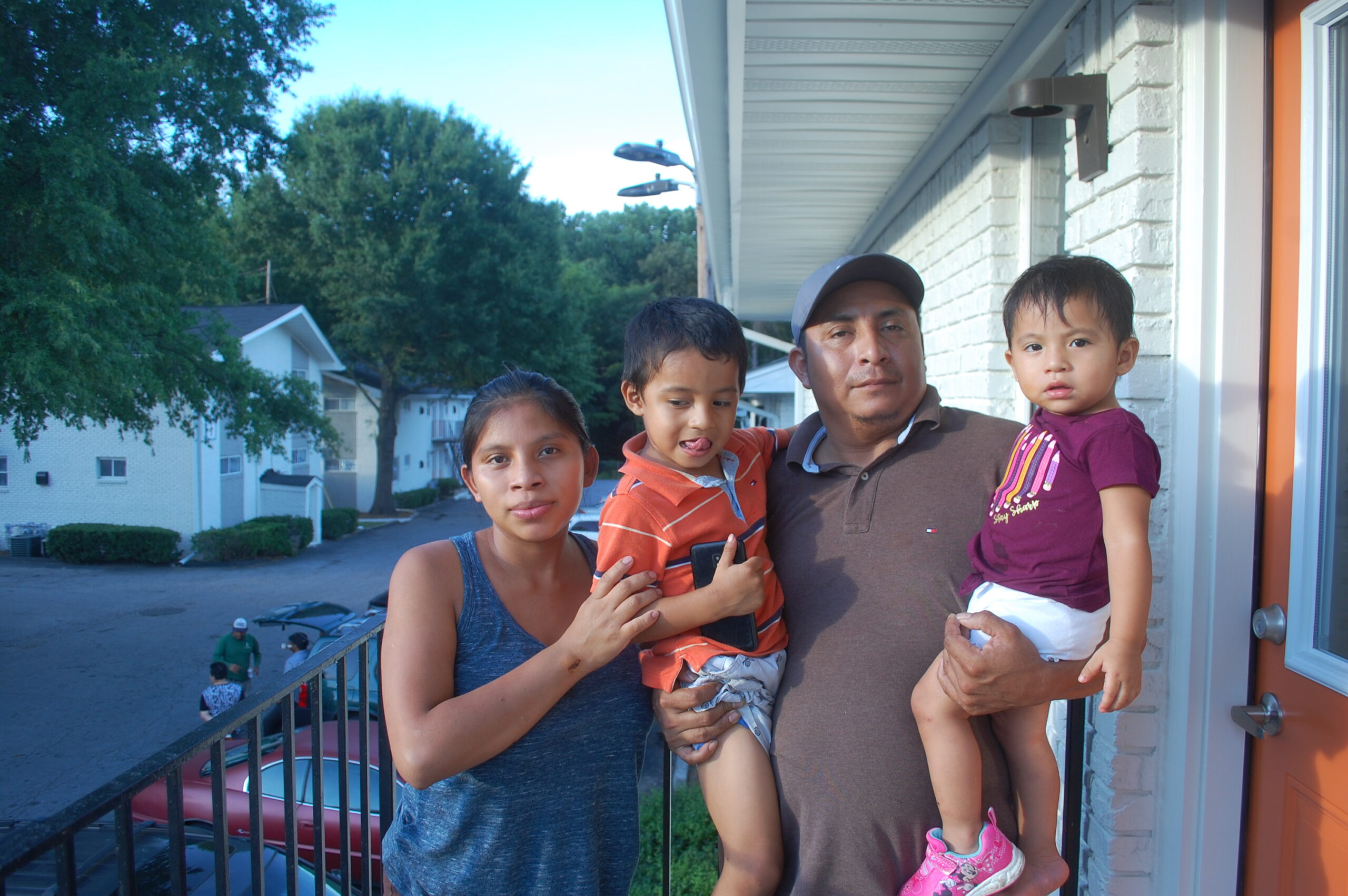
Adan Tobar and his family are among the tenants at Moores Mill Village in Northwest Atlanta who recently received notices to move.
Stephannie Stokes / WABE
There’s a small park wedged behind Marietta Boulevard that’s meant to represent diversity. It’s named after Sara J. Gonzalez, a Cuban activist who once lived nearby.
More than a third of the people in this slice of northwest Atlanta at the edge of Buckhead are Latino, according to recent Census surveys. Another third are Black.
But the 40 or so residents who are at the park this evening did not come to celebrate that diversity. They’re here because their landlord told them to move.
They’re gathered in a circle. Those who speak Spanish are on one side, English speakers on the other. In the center, an attorney with the Atlanta Volunteer Lawyers Foundation and a member of the Mayor’s Office of Immigrant Affairs explain in both languages their legal options.
The tenants don’t have many. What’s happening in their apartments across the street, known as Moores Mill Village, is something that’s happened in Atlanta many times before. The complex got new owners. And they want to renovate.
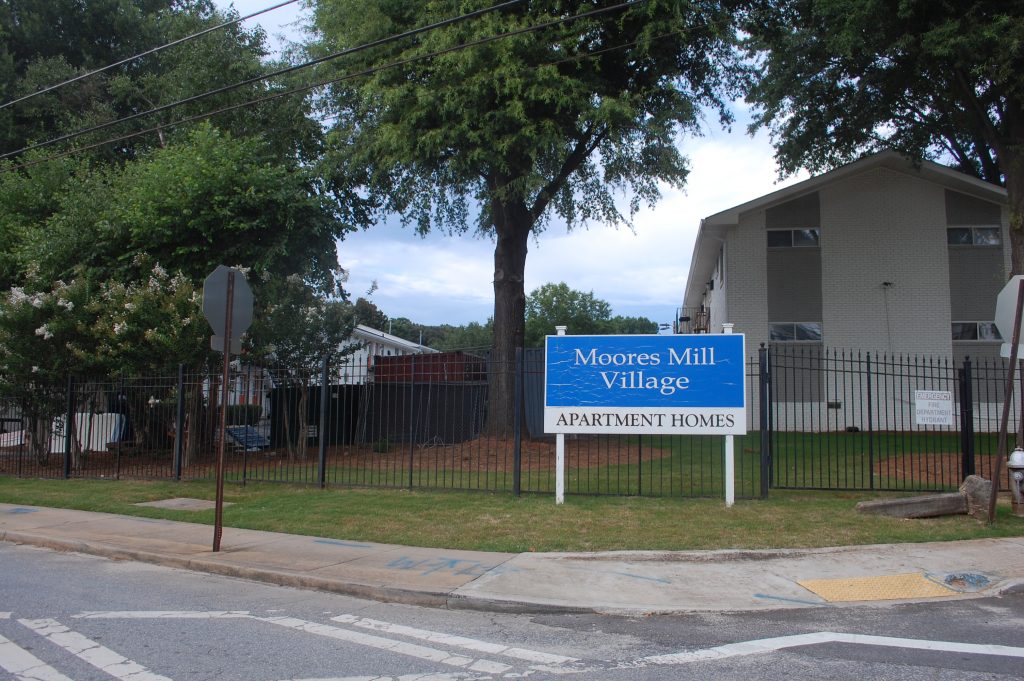
It’s a familiar story. The only thing new is the backdrop: this is gentrification during a pandemic.
COVID-19’s upending effect on the economy has created a fear that many could lose housing in the months ahead. But the community here is learning that preexisting forces, like new development and rising rents, continue to cause displacement too despite the outbreak.
“It’s just a compounding factor that it seems like the owners of these apartment complexes didn’t take into account at all,” said Luisa Cardona, deputy director of the Mayor’s Office of Immigrant Affairs.
She said her office has worked in Moores Mill Village for several years. And in a way, both she and the tenants saw these renovations coming.
The apartment units are in bad shape. At the same time, the surrounding area has become more attractive to developers. A new Publix opened next door. Townhomes are under construction across the street.
Still, Cardona said the notices some tenants received say they have to be out within days. According to the letters, if residents overstay, the complex will charge double rent.
“We understand that changes are happening. We understand that renovations needed to happen in these units,” Cardona said. “But it didn’t have to be done in such an inhumane and heartless way where it hurts families and communities so much.”
The owner of Moores Mill Village, Castlegate Properties, responded to emails, saying it’s been in contact with tenants since purchasing the property last year and has been flexible. It said that it can’t put off the repairs indefinitely.
Cardona said the company’s decision comes as the pandemic already has harmed the families at Moores Mill Village. Many were laid off when the outbreak started. Some have fallen sick with COVID-19 or lost family members to it.
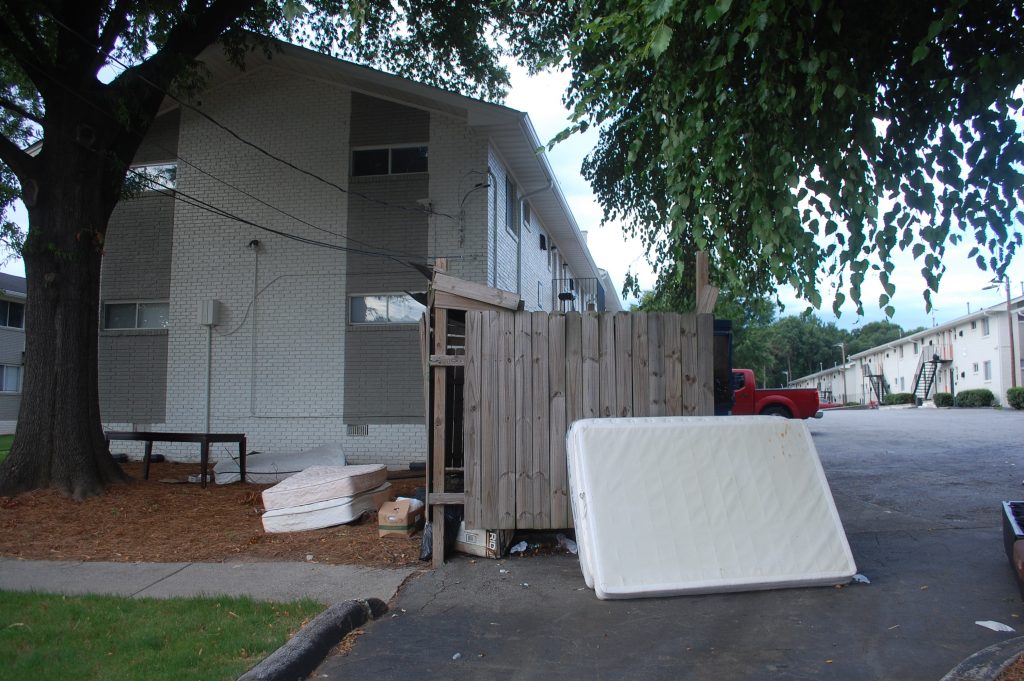
Adan Tobar worries about the virus as his three-year-old runs around the park playground. With all that the son touches, he said it can be dangerous.
Tobar has his own challenge. Recently, he’s had to watch his children full time. His wife gave birth prematurely, and she’s recovering. Their newborn is still in the hospital.
He said until they’re both better, he can’t work. So he can’t get money to pay rent. Let alone pay for a new place.
“I can’t do anything,” Tobar said, speaking in Spanish. “Only ask God.”
There isn’t much anyone can do to help the tenants at Moores Mill Village stay long-term. The language in the notices to vacate, from the 30-day deadline to the promise of charging double rent, follows the terms in the tenants’ leases.
So the city’s office of immigrant affairs is working with a nonprofit to help families, like Tobar’s, leave.
A week after the meeting in the park, the residents are out in the Moores Mill Village courtyard. The music playing from the units shifts from lyrics in Spanish to English.
One after another, tenants fill out forms with the help of two volunteers with Los Vecinos. Using grant funding that the city secured, the group is handing out gift cards with $1400 to more than 60 families.
Dia Parker, who is executive director of Los Vecinos, said the residents could use the money to cover moving expenses or pay for a security deposit at their next apartment.
But the financial assistance only goes so far. Parker is finding some residents are struggling to find new places in their price range.
“Just like prior to the pandemic, if you can only afford $900 for a two-bedroom, there’s not a whole lot of options,” she said.
Residents of neighborhoods like the one around Moores Mill Village are needing to look well outside their community, she said, even on the other side of the metro area.
While there may be a new focus on evictions and displacement because of the pandemic, Parker sees the virus outbreak just amplifying a housing crisis that existed before.
Her group has worked with immigrant communities around Atlanta, especially along Buford Highway, who for years have watched their low-cost apartments disappear.
“We’ve been trying to show folks how essential it is for affordable housing to be preserved,” Parker said. “And I think people are really just now getting it.”
The next week at Moores Mill Village is the last of the month. Many of the families have moved out. Mattresses pile on top of the dumpsters.
They’re visible from Sara J. Gonzalez Park, the greenspace that aims to honor diversity. The park will be there, at least, even when the community is gone.



